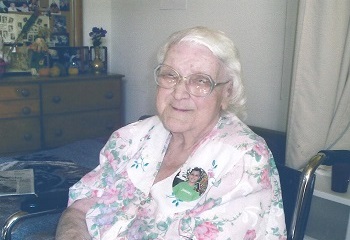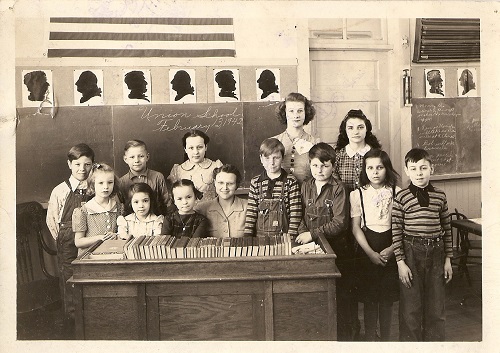My Country School Teacher
Frances [Kessler] Gerhard, my country school teacher for the first six years of my schooling, died Wednesday, June 17, 2009, at the age of 97. Her husband, Cecil, died the previous year after they had celebrated 63 years of marriage.
I went to her funeral at Bramley Funeral Home. It was very moving and quite filled with old friends and former students. Tim Bramley, proprietor of the funeral home, met me at the door and said he'd read my newspaper article about Frances and her one-room schoolhouse. I wrote the two-page spread in the Auburn Citizen in the 1970s. Tim told me that Frances had been his Kindergarten teacher in Divernon, and he is 51 years old!
The day after her funeral, I went to the Cumberland Sugar Creek Cemetery, located east of the Union School site northeast of Auburn. I wanted to visit her grave alone, so I went after Sunday morning Mass. I found the grave easily, freshly heaped with earth, topped with the same radiant yellow roses that had sat atop her coffin. I don't know if yellow roses were her favorite flower. I slipped three roses out of the arrangement to bring home to remember her by.

Many years have passed since I went to her school, but somehow I still feel very connected to her. Recently I visited her at Sunrise Manor Nursing Home in October, 2007, about six months before her husband, Cecil, died. She remembered me very clearly when I went into her room. Cecil was also there in a wheel chair. He was polite, but I could tell he was embarrassed to be seen like that, and he soon left the room.
I snapped a good picture of her, and I sent one to my classmate, Doris, who now lives in Arkansas. Yesterday I called Doris to tell her our teacher had died. She was sorry to hear it, but commented that now she is at peace in Heaven. Poor Mrs. Gerhard had had both legs amputated because of diabetes damage. I'd heard at a classmates' lunch last month that she was having pain at the bone ends.
Six years ago, I visited Cecil and Frances at their home before they moved to the retirement community, Eastland. We had a nice visit, and we talked about the old school days. The children who attended the school were mostly farm kids, and many of them, like myself, came from families that had immigrated to America only a generation ago. Mrs. Gerhard reminded me that she tried to keep the school children away from the windows the last day of school before Easter so her brother could hide Easter eggs in the schoolyard.
She had two brothers she loved dearly, Bill and Chester (or Chet). Both served in the Army in World War II during my early years in school. Whenever they were on leave, they were likely to appear at the school. Both brothers helped their sister if her car wouldn't start. Both came back from the war to become farmers, just like their parents.
Before she married, when she lived at home with her parents, Miss Kessler came to school from the south, passing my country road. Every day I walked a few miles to school. She arranged for me to meet her at the crossroad at a certain time, and she gave me a ride the rest of the way to school.
After she met Cecil Gerhard, who came to fix the school pump at Union School, they were married on July 5, 1945. They settled into a farmhouse near the Sugar Creek Cumberland Cemetery east of school, after which I couldn't catch a ride any more.
I remember being at their country house at Christmas when she entertained the children. I must've been in fifth or sixth grade because I recall being very interested in a young boy, Leroy, who wore a brown argyle trimmed sweater.
Mrs. Gerhard held school plays—one at Christmas and another event on the final days of school. We memorized lines for a play, for songs, or for skits. We even had a stage curtain that we pulled across the front of the room while the parents watched from our desks and from other chairs. We used the cloakroom as a dressing room. I recall a father telling another spectator that this "would've been pretty good if they had any talent."

Mrs. Gerhard also treated any student with perfect attendance to a trip to the annual street carnival in Auburn, an event greatly anticipated by all the children in town. The trip included tickets for the merry-go-round and other thrilling rides.
It was evident that Frances Gerhard loved children. She was always soft-spoken and kind, though she did raise her voice on occasion. She had to be in charge, but she had to mother the kids, too. I remember her being concerned when we came in with our wet clothing from walking in heavy snow. Girls didn't wear pants to school, except for 'snow pants.' Sometimes our lisle stockings were wet, and sometimes socks and snow pants were soaked, so we hung them behind the square jacket of the stove to dry for our trips home.
Occasionally there were Community Club gatherings at the school, but our family did not normally participate. My father had to drive to Pillsbury Mills early in the morning, and he had morning and evening farm chores. Once, though, we did participate, and my mother gave me a jar of home-canned peaches to contribute. My strongest memory is of the food table. There was a bowl of beautiful fried chicken and I suffered indecision about whether to take a piece or not. I didn't take a piece—why I can't remember—and I still regret it.
Once, before she married, Miss Kessler took me home to her mother's house in Divernon. I remember a room with a long table and cabinets with glass doors in them. Certainly she honored other students besides me, but that night I was the only child in her world.
A week or two after I started seventh grade, Union School was consolidated into Auburn, and that was the end of Frances Gerhard's country school teaching. My brother, Bud, and I were transferred to "town school" in Auburn. We rode to school on a large yellow bus (no more walking). Later, after starting a family with her husband, Mrs. Gerhard resumed teaching kindergarten in Divernon, where she taught for eleven or twelve years.
Several of Frances' students came to the funeral home—Norma, Donald, Charles, and others I didn't know. One student stood outside because she had a bad allergy attack and couldn't come in.
Though it had been more than sixty years since I'd sat in Mrs. Gerhard's classroom, it may as well have been a week. The effect of her teaching never wore off. Mrs. Gerhard loved her students by tending to the things that mattered personally to us—by drying our wet clothes, by giving us starring roles in plays, by singling us out as worthy to come into her house. She believed in us—we who'd come from parents who toiled in the soil, who'd stepped off immigrant ships only a few decades ago—until we learned to believe in ourselves.
My teacher's name will not appear in the history books. But to me, she is a heroine.





